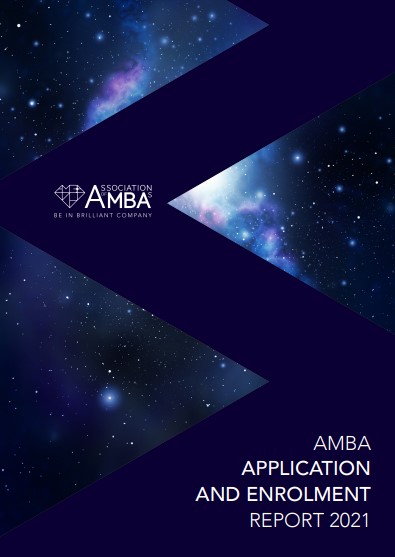Globally, 43% of MBA programmes were taught online in 2020 despite only 12% of programmes being intended to be taught this way, according to new research from the Association of MBAs (AMBA).
The AMBA Application and Enrolment Report 2021 also found that despite global turbulence, the volume of applications received by each Business School increased by a worldwide average of 7% from 2019 to 2020. The volume of applications received by each individual programme increased by an average of 9% in the same timeframe.
Key Findings
Changes to MBA demand among AMBA-accredited Business Schools, 2019-20 (216 participating Schools)
Numbers reveal extent of the great shift online
- Globally, programmes taught in the classroom decreased by 55 percentage points between 2019 and 2020.
- Programmes taught online increased by 36 percentage points from 7% in 2019 to 43% in 2020.
MBA student recruitment
- Globally, the volume of applications received by each Business School increased by an average of 7% from 2019 to 2020. The volume of applications received by each individual programme increased by an average of 9% in the same timeframe.
- Application volume per programme increased by 45% in Africa, 23% in India and 22% in the UK from 2019 to 2020.
Diversity in MBA programmes
- The global average proportion of women enrolling onto MBA programmes rose by one percentage point between 2019 and 2020, from 38% to 39%.
- Globally, the proportion of international applicants to MBA programmes increased by an average of one percentage point, while the number of international students enrolled decreased by one percentage point between 2019 and 2020.
- In 2020, North America and the Caribbean saw a decrease of seven percentage points in its proportion of international applicants and a decrease of eight percentage points in its proportion of international students enrolled, when compared to 2019 figures.
MBA programmes in the AMBA-accredited network in 2020 (238 participating Schools)
Numbers reveal extent of the great shift online
- Globally, 76% of MBA teaching was intended to be classroom-based, but only 29% of courses were ultimately carried out in a classroom.
- 41% of courses were carried out online when only 11% were originally intended to be taught online.
MBA student recruitment
- The global conversion rate among AMBA-accredited Business Schools in 2020 was 32%.
- Globally, the acceptance rate was 44%.
- The global average yield for AMBA-accredited Business Schools was 73%.
- Globally, the conversion rate for international students was significantly lower than that of domestic students (27% vs. 34%).
Diversity in MBA programmes
- Globally, 40% of applicants and 39% of those enrolled were female.
- International students outnumbered their domestic counterparts among those enrolling in Business Schools in the UK in 2020, representing 54% of all those enrolling. This was the only country/region in which the average proportion of international students enrolled was more than 50%.




